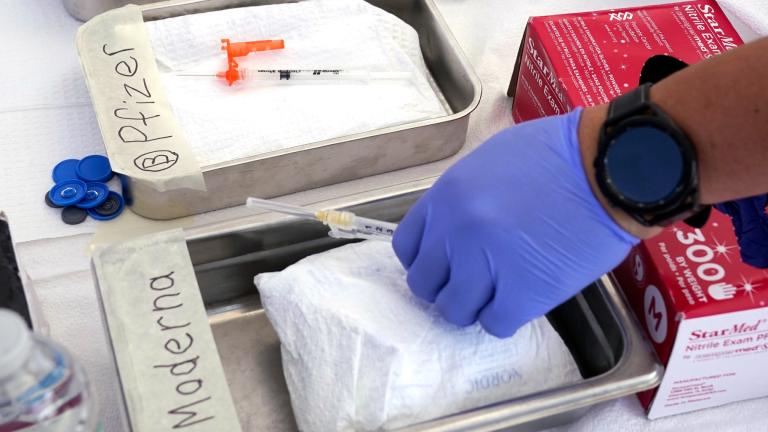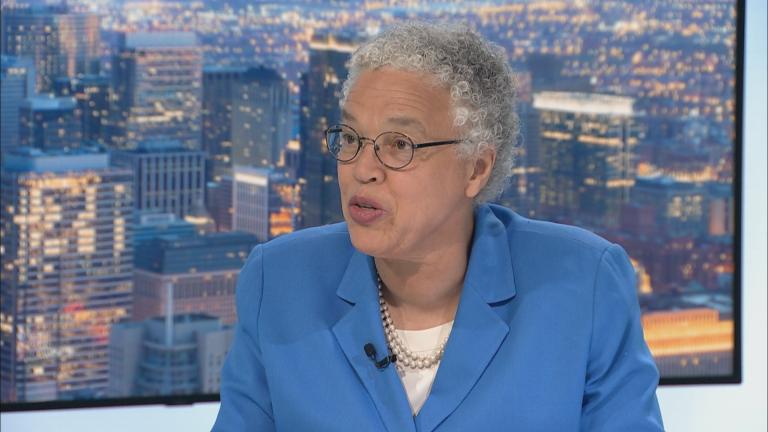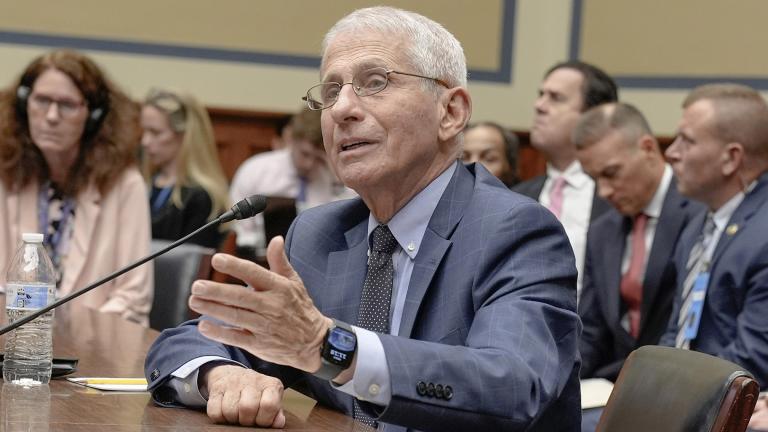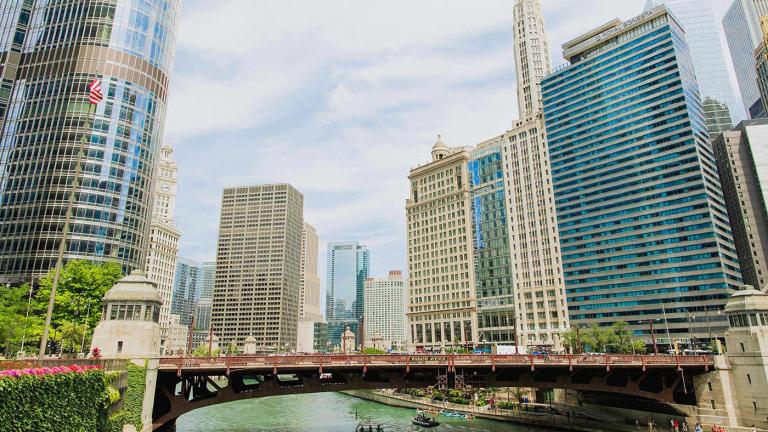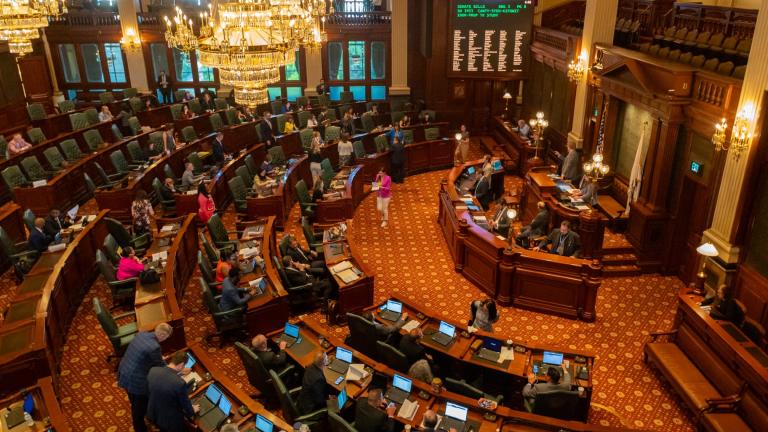State, county and city health officials are not systematically tracking outbreaks of COVID-19 in Chicago day care facilities, leaving parents flying blind as COVID-19 cases increase yet again.
While the Chicago Department of Public Health and the Cook County Department of Public Health require day care facilities to report outbreaks of COVID-19 — defined as two or more lab-confirmed cases of COVID-19 occurring within 14 calendar days of each other — that data is not publicly available to parents.
Data provided by Chicago health officials to WTTW News show nine outbreaks at Chicago day care facilities between Jan. 2 and March 27, but officials acknowledged there were likely more outbreaks since the department has no authority to force day care facilities to report outbreaks or to levy sanctions against those that fail to do so. More recent data was not available.
That lack of information makes it difficult for parents to make data-informed decisions about the risk they are willing to take when it comes to COVID-19 and their children, said Dr. Zachary Rubin, a board-certified pediatrician specializing in allergy and immunology.
“It is a rather complicated, tricky situation for parents to be able to navigate because they may not be able to control that situation as they’re sending them off for other people to watch,” said Rubin, who is treating increasing numbers of children diagnosed with COVID-19 who are experiencing chronic symptoms, including coughs, heart ailments and neurological symptoms as part of his Oak Brook-based practice.
To qualify as an outbreak, those cases of COVID-19 must be confirmed by a lab — and children who test positive via a home kit are not counted in that data, officials said. There is no mechanism for results from home tests to be reported to city, county or state health departments.
Children younger than 5 are still ineligible to be vaccinated against COVID-19, and many are too young to reliably wear a mask to prevent the spread of COVID-19, leaving them at a heightened risk of getting, or spreading, the virus, according to health officials.
Chicago health officials have not required staff and older children to wear masks at Chicago day care facilities since Feb. 28, when Gov. J.B. Pritzker and Mayor Lori Lightfoot lifted the indoor mask mandate that had been in place for more than six months. Health officials recommend that day cares that have experienced outbreaks require staff and children to wear masks for two weeks.
That flies in the face of a recommendation from the Centers for Disease Control that everyone wear a mask or face covering in early childhood facilities at all time.
Children and teens made up approximately 19% of all lab-confirmed cases of COVID-19 between Feb. 26 and April 25, according to data from the Chicago Department of Public Health. Of the more than 3,400 children and teens who tested positive for COVID-19 during the past two months, 30 were hospitalized and one died. Eight children and teens have died from COVID-19 since the beginning of the pandemic, according to that data.
Rubin said COVID-19 poses real risks to children, even as health officials have stopped imposing restrictions designed to stop the spread of COVID-19.
“We’re all tired of this pandemic,” Rubin said. “But we can’t ignore the risks of this virus because things around us seem to be relaxing.”
Meredith Shiner’s 19-month-old son, Carter, tested positive for COVID-19 on March 31, less than a day after another child who attends the same Lincoln Park day care came down with the virus. Shiner and her husband tested positive after their son became ill, forcing the whole family to isolate at home for three weeks while struggling to work.
COVID-19 “sucked out all of his energy and just replaced it with a fever,” Shiner said of her son’s symptoms.
Nearly a dozen other toddlers in the same room at the day care tested positive, along with all four staff members assigned to the room, Shiner said.
The COVID-19 risk in Chicago has been at a low level since federal officials changed the way they measured the peril posed by the novel coronavirus to focus on hospitalizations rather than the percent of positive COVID-19 tests as compared with the number of negative tests, as was the case for most of the more than two-year-long pandemic.
Chicago Department of Public Health Commissioner Dr. Allison Arwady said Tuesday during an online question-and-answer session that Chicago is experiencing a “gradual” increase of cases, but not a surge.
“I’d call it a little more of a ripple as opposed to a wave,” said Arwady, who has repeatedly said that COVID-19 cases in schools and early childhood facilities stay in line with the wider community and those facilities not a source of significant transmission or spread.
Hospitalizations are a lagging indicator of a surge of confirmed COVID-19 cases, usually coming two to three weeks after a diagnosis.
That could mean a significant surge could be building undetected, putting unvaccinated children at a much greater risk than other age groups, Rubin said.
“While the risk is small, compared to adults, it is the highest risk group of children who can end up in the hospital or having severe disease” because they are unvaccinated, Rubin said.
COVID-19 is much more deadly for children than the flu, and very little is known about the virus’ long-term impact on those who get sick, Rubin said.
The lack of a concerted effort by health officials to stop COVID-19 from spreading is “really scary as a parent of a young child,” Shiner said.
Shiner said she was furious when her entire family got sick at a time when national, state and local health officials repeatedly said the acute phase of the pandemic had ebbed, and exhorted people to go back to their normal lives.
“Of course that was upsetting,” Shiner said, adding that she worried about those who did not have the ability, as her family did, to isolate at home without threatening their jobs or exposing others at greater risk. “We did the most that we could to protect him and it wasn’t enough because we’re not choosing as a community to do a little bit more to protect him.”
Day cares must also report COVID-19 outbreaks to the Illinois Department of Public Health and the Department of Children and Family Services, but neither agency provides that data to the public. In fact, state health officials stopped updating the website it used since July 2021 to identify where outbreaks of COVID-19 occurred on April 11.
Chicago health officials told WTTW News they “proactively” work with day cares and other facilities that have suffered an outbreak “on an appropriate response that could include a recommendation for quarantine of individuals or classrooms and guidance on mitigation efforts.”
Parents can also make sure their children are as safe as possible by quizzing day care operators about whether the staff is vaccinated, and whether they are following the rules for quarantine or isolation after a confirmed case of COVID-19, Chicago health officials said.
Shiner said that was woefully inadequate.
“What I want from CPDH and the mayor is to actually be transparent about the outbreaks in facilities that are places that infants and toddlers are being taken care of,” Shiner said. “I want them to be honest about the risks there. Just be honest with us.”
Day care operators should not be forced to make these decisions on their own, with only limited guidance from health officials and forced to confront parents who may be unwilling to comply with recommendations, Shiner said.
“For a really long time we had these checks in place and there weren’t huge outbreaks,” Shiner said. “I don’t want babies or toddlers to die.”
Rubin said he did not want families with young children to lose hope, and he said he expects a vaccine to be available by this summer for children younger than 5.
“It will get better,” Rubin said.
Contact Heather Cherone: @HeatherCherone | (773) 569-1863 | [email protected]

